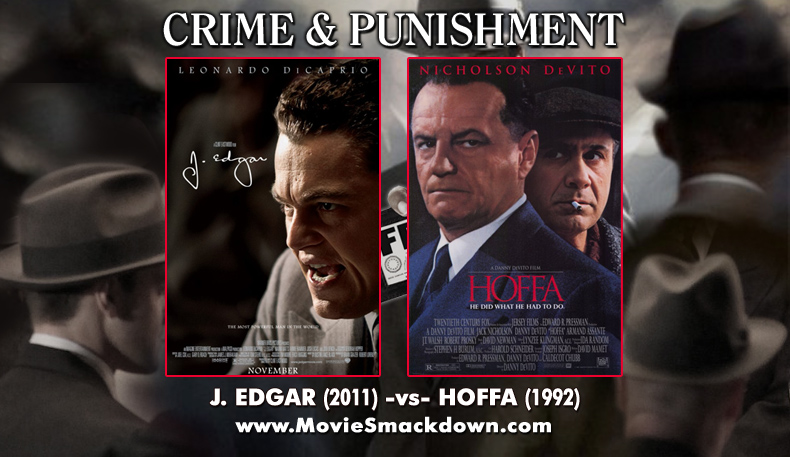
The Smackdown
Jimmy Hoffa is arguably the most famous trade unionist in American history and for 50 years, J. Edgar Hoover was one of the most powerful men in the country. Both Hoover and Hoffa were iconic, controversial figures — at once hero and villain, both revered and reviled. Each faithfully served his own ideas of justice and did anything and everything he could to hold on to his power.
Both J. Edgar and Hoffa offer flawed historical figures portrayed by A-list actors in prosthetics. Their stories are told in flashbacks spanning several decades, using impassioned speeches to elucidate the theme that sometimes you’ve gotta break a few laws to protect what’s yours. In this Smackdown, two of the greatest American figures of the 20th century go head to head. It’s a fair fight here at the Smack, which according to historical record, and its depiction in these films, may be more than these two bruising sluggers deserve.
The Challenger
J. Edgar tells the story of the first director of the Federal Bureau of Investigation, a man who, for nearly five decades spanning eight presidents’ administrations, ran the FBI as if it were his own personal fiefdom. One of the most powerful men in the United States, Hoover would stop at nothing to protect his country, often bending the law to the breaking point in his battle against threats both real and imagined.
The film moves back and forth through time, between an aging Hoover (Leonardo DiCaprio) dictating his self-serving memoir to a succession of attractive young men, to key episodes in Hoover’s life and the beginnings of the FBI — the 1919 Bolshevik bombings that began his obsession with fighting Communists and other domestic threats; the kidnapping and murder of Charles Lindbergh’s infant son, a widely publicized crime that Hoover used to strengthen the power and reach of the FBI; his determination to present himself as the ultimate G-man, defeating notable gangsters and others he deemed to be “radicalsâ€; and his dogged pursuit of information that he could use to blackmail those he perceived as threats to his power — people such as Eleanor Roosevelt, Martin Luther King Jr., and even a sitting president, JFK.
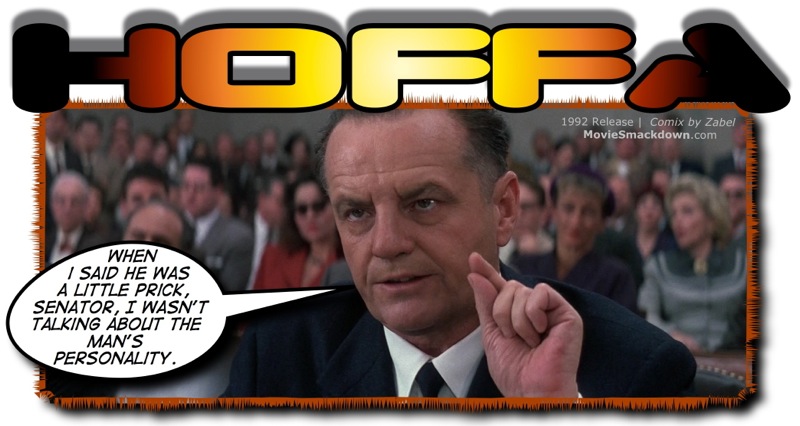 The Defending Champion
The Defending Champion
Jimmy Hoffa was an American labor union leader, though most people remember him for his 1975 disappearance — a vanishing act still unexplained. Hoffa begins on the eve of that disappearance. Hoffa (Jack Nicholson) and his sidekick Bobby Ciaro (Danny DeVito, who directed) are waiting in the parking lot of the Roadside Diner for a meeting with mob boss Carol D’Allesandro (Armand Assante). While they wait, Bobby reminisces about how he first met the enigmatic Hoffa, who, in flashback, hops into Bobby’s truck and tries to convince him to join the Teamsters. Bobby is interested in what Hoffa has to say but is afraid being seen with him could cost him his job. Eventually, it does, but in losing his position, he becomes an even-more constant companion to Hoffa.
Bobby faithfully follows Hoffa as he leads the Teamsters union on strike, which results in a violent riot and multiple deaths. Bobby is there while Hoffa makes back-room deals with oily Mafia dons, and he’s also present as the union boss squares off against his arch-nemesis, Attorney General Robert Kennedy. Bobby is even by Hoffa’s side as they’re both sent to prison on charges of jury tampering, attempted bribery and fraud. And there he is again, when the labor boss is gunned down in that Roadside Cafe parking lot (a matter of cinematic conjecture rather than historical certainty).
The Scorecard
Written by Dustin Lance Black and directed by Clint Eastwood, J. Edgar paints a picture of a sympathetic monster, a powerful and dangerous man who covets more than anything his mother’s approval and the admiration of others. On one hand, he built the FBI into the modern organization it is today, championing the use of fingerprints and scientific crime-scene investigation. On the other, he was a vindictive, paranoid, racist egomaniac, who greatly abused his power. DiCaprio does an excellent job of imbuing an unlikable and often reptilian character with unexpected empathy.
The film’s emotional center is Hoover’s relationship with his right-hand man, Clyde Tolson (Armie Hammer). When Clyde and Hoover first meet, it appears to be love at first sight. Clyde is charming, bordering on flirtatious, and Hoover is obviously flustered. Although Clyde doesn’t meet Hoover’s rigorous standards for his agents, the FBI czar offers him a job. Soon, like Hoffa and Bobby, they are together all the time. When Hoover offers Tolson the position of his second-in-command, Clyde accepts, with one condition: “Good day or bad, agree or disagree, we never miss a lunch or dinner together.â€Â And they don’t. For 40 years, the two men work together, share practically every meal together and even take vacations together. When Hoover dies, Clyde inherits most of his possessions, including his family home, and the two are even buried near each other. Clyde acts as Hoover’s conscience, warning him against digging too deeply into other people’s secrets and calling him out on his transparent self-promotion.
Armie Hammer’s Clyde is handsome and suave, yet quite gentle with the skittish Hoover. Hoover loves Clyde but is unable to admit it, even to himself. This may be due in part to his suffocating mother, played brilliantly by Judi Dench. In one of the film’s most chilling scenes, Hoover stutteringly confesses to her that he doesn’t like to dance, but most of all he does not like to dance with women. “I’d rather have a dead son than a daffodil,†she tells him coldly, before teaching him a few basic dance steps. This is as close as the film gets to addressing J. Edgar’s long-rumored homosexuality, but the filmmakers never make clear whether he ever acted on his impulses. The only other woman in Hoover’s life, as presented here, is Helen Gandy, his loyal secretary, played wonderfully by Naomi Watts.
Hoffa, written by David Mamet and directed by DeVito, just doesn’t have the same emotional punch. After spending two hours watching Hoffa rise from labor organizer to union boss, we still know hardly anything about the labor movement, and even less about Hoffa himself. Nicholson does a fine job portraying the granite-faced Hoffa, but neither he nor the film truly gets to the character’s center. It’s clear that the Teamsters — and Devito’s Bobby in particular — believe Hoffa is a great man. He talks the talk, he walks the picket lines, he’s not afraid to get dirty. But why? What makes him care so damn much? Is it just a path to power? Little is explained about Hoffa’s past or personal life. Halfway through the film his previously unmentioned wife and kids seem to appear out of thin air, apparently a second-reel attempt to flesh out the somewhat one-dimensional lead character.
And then there’s the seedier side of Hoffa’s organization, which seems to be whitewashed in the film. His ties to the Mafia, his use of violence and intimidation, are almost shrugged off, portrayed as a necessary evil and nothing more than Detroit’s version of business as usual.
The Decision
Wherever Jimmy Hoffa is — and it’s rumored to be holding up a parking structure somewhere or as part of football stadium foundation or an interstate freeway — Hoffa doesn’t do his life justice. DeVito’s direction, which oddly focuses a little too much on his own character, Bobby, detracts from a story that should be far more powerful and engaging than it is.
J. Edgar is the clear winner of this clash of the egomaniacal titans. No matter how you feel about the senior G-man’s legacy, this film will leave you with a nuanced portrait of a man who was known to many but understood by few.


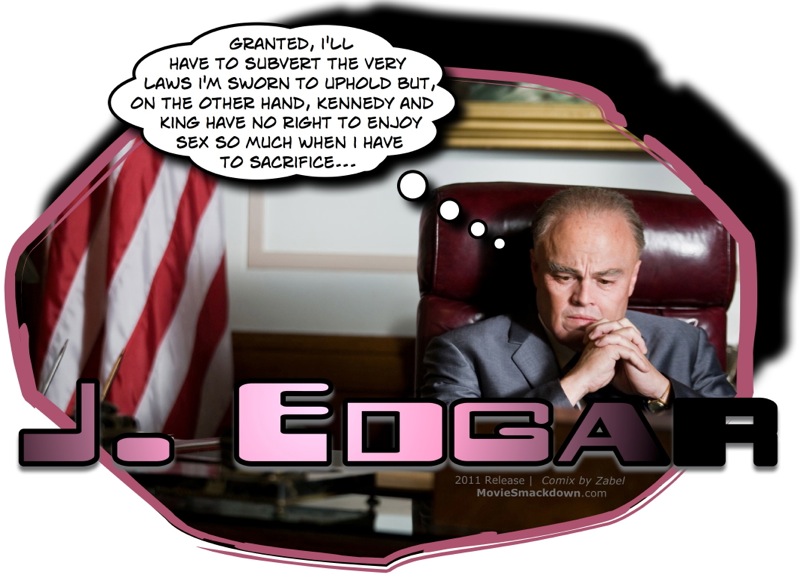
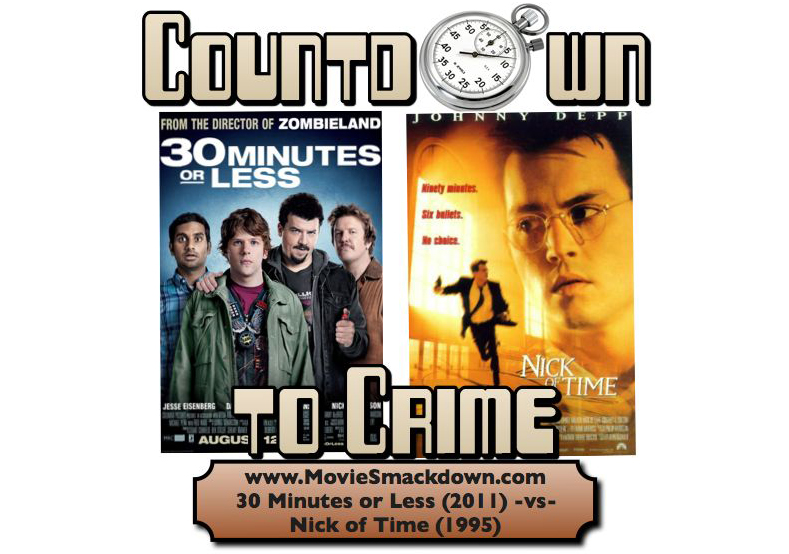
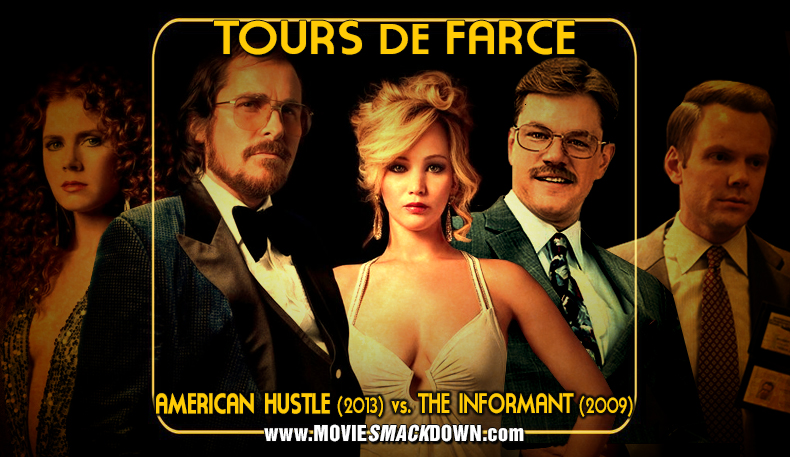
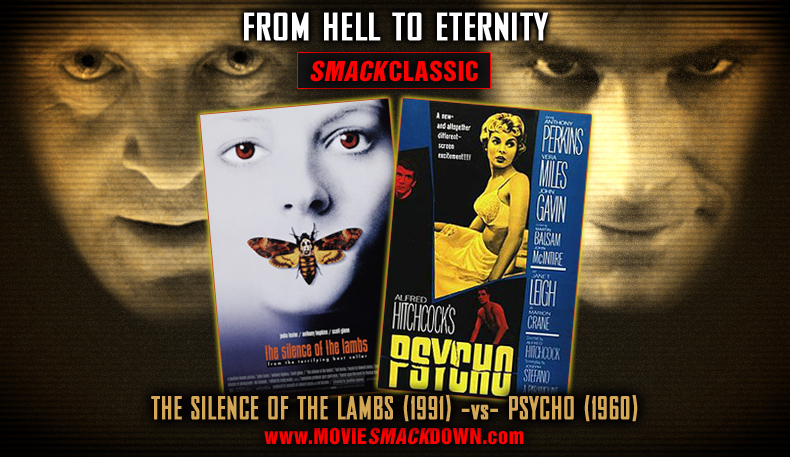
You guys nailed how similar these films are… both these dudes, by the way, tangled with Bobby Kennedy big-time. Imagine the balls RFK had to have had to know that he’s pissed off two guys as crazy and dangerous as Jimmy Hoffa and J. Edgar Hoover.